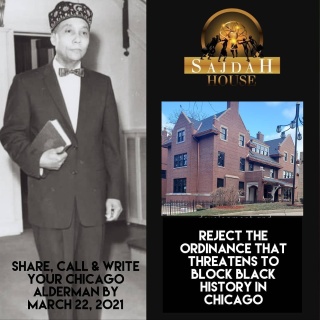Wendy Muhammad
SajdahHouse@gmail.com
773-655-8796
Homes of Emmett Till, Muddy Waters, Phyllis Wheatley and Elijah Muhammad
(Black PR Wire) As Proprietor and Developer of Sajdah House(r) which is the former home of the Most Honorable Elijah Muhammad, I strongly oppose any restriction to limit cultural exhibits in residential districts. For over 50 years, Chicago has permitted “cultural exhibits and libraries” in all R- districts, permitting the preservation and exhibition of art, books, manuscripts, recordings, and cultural and historical resources for study and reading.
Chicago is rich in history for many cultures but especially African Americans. Five hundred thousand African Americans ultimately moved to Chicago. In the first wave of migration between 1915 and 1940 Chicago's black population more than doubled during that time. Many of those historical migrants became influential pioneers and historical giants not only in the country but in Chicago especially.
From the great Muddy Waters who at the very least was the “father of modern Chicago blues” to Mamie Till — Mobley who was the great mother of our slain brother Emmett Till who was murdered on August 28, 1955 at the age of 14 for allegedly offending a white cashier woman at a grocery store. The list of historically significant sites also include the National A. Philip Randolph Pullman Porter Museum, Glessner House, the Graham Foundation, the Charnley- Persky House Museum, the Robie House, and the Driehaus Museum. House museums under consideration include the Lu Palmer Mansion, and the Phyllis Wheatley House.
Sajdah HouseoR sits right in the 4th c ard where this Proposed Ordinance Originates. It is the former home of the Most Honorable Elijah Muhammad, whose home is one of the single most important pieces of property in modern day Black History. More leaders have dined and met in this home at 4847 South Woodlawn Avenue in Chicago, from the great Rev Dr. Martin Luther King Jr., Mrs. Coretta Scott King, Malcolm X, Mrs. Betty Shabazz, Senator Adam Clayton Powell, James Baldwin, Hosea Williams, Muhammad Ali, Kwame Toure and even members of the historical 1968 Black Delegation for the Democratic Convention. All of these historic sites are Sacred Spaces.
These properties help to tell important stories that have had a major impact in Chicago and beyond. At least 35 cultural exhibit organizations peacefully co-exist in Chicago’s multicultural urban residential neighborhoods spanning over 22 wards. I strongly oppose any restriction including any requirement to obtain a “special use” permit or “grandfathering” existing sites. A “special use” permit requires substantial up-front investment that many sites would be unable to overcome. “Grandfathering” existing sites does not provide protection, as any prolonged period of closure would make such uses illegal. For example, shutdowns like the ones due to COVID would have made these long-standing house museums and cultural exhibits illegal.
An attempt to change history with the aim of stopping us from celebrating and educating others about our rich history in this great city is not only shameful but neglectful of cultures whose stories are often rewritten and discarded. This is especially harmful to the African American community as well as the Muslim Community.
Arts and culture organizations and private research libraries impacted by this proposed ordinance, including house museums and other small cultural institutions, honor and preserve the literary, artistic, and cultural history and legacy of our city and will be devasted by this proposed change in law.
I am asking you to reach out to your Alderman and specifically ask them to oppose Alderman Sophia King’s proposed Amendment to Municipal Code Section 17-2-0207 restricting cultural exhibits and house museums in “R” zoning districts in the City of Chicago. This ordinance is a fundamentally misguided initiative that would dramatically and negatively affect the cultural life of the great city of Chicago and aid in the continued smothering and suffocation of the history of many great African Americans.
Cultural and historic sites contribute positively to their neighborhoods acting as anchors in their communities. They provide an opportunity for the many stories that make up the history of Chicago to be told.
PLEASE CLICK BELOW TO SIGN THE PETITION TO SAVE THESE HISTORIC HOMES:

